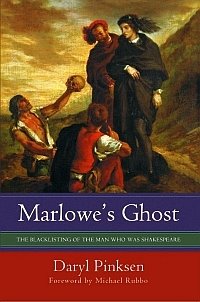
A question for Daryl Pinksen, author of Marlowe's Ghost
Originally posted on The Marlowe-Shakespeare Connection
Carlo: Daryl, as I was reading your recent work, Marlowe's Ghost: The Blacklisting of the Man Who Was Shakespeare, I was struck by your description of Robert Poley, one of the three men who was with Marlowe the day of his alleged death. The other two were Nicholas Skeres and Ingram Frizer. Frizer was Thomas Walsingham's servant (ed. note: see 6/19 post on Walsinghams) and probably a low-level intelligence operative; Skeres, you suggest, might have been an operative in the Earl of Essex's intelligence network. And then there's Poley, someone with a very interesting intelligence background and a fairly experienced agent. Please elaborate.
Daryl: Thanks Carlo. The fact that Robert Poley was at the Deptford meeting is remarkable. It's commonplace to hear people refer to the 1593 Deptford incident as a "tavern brawl." Far from it. The four men who gathered there were, as Charles Nicholl called them, scoundrels, Marlowe included, and all four were involved in shady dealings, linked in some way to the Elizabethan underworld. But Poley's presence at the meeting makes it an exceptional event.
Marlowe, Skeres, and Frizer were lightweights, minor cogs in the Walsingham/Burghley-led intelligence machine (ed. note: see 6/23 post on Cecils). Robert Poley was in a different league entirely; in 1586 he had been instrumental in exposing the Babington Plot, which led to the execution of Queen Elizabeth's cousin, Mary Queen of Scots. In The Reckoning, Nicholl's meticulous exploration of Marlowe's demise, he tells us that in the months leading up to Deptford, Poley was engaged in high-level diplomatic liaisons between The Hague, England, and Scotland. Here's where the story takes a turn - Nicholl's research reveals that for ten days following the Deptford meeting, Poley's whereabouts are inexplicably unknown. Where was he? Nicholl has no idea, but circumstances suggest that Poley may have been in Scotland, as Marlowe's escort. Years earlier, Poley had been recommended as an agent who knew "the best ways to pass into Scotland." And Marlowe, in his last conversation with Thomas Kyd (a playwright Marlowe had once shared a room with) said he was determined to go to Scotland, and mentioned that another of his literary friends, Matthew Roydon, had already gone. Marlowe urged Kyd to join them.
If Marlowe did survive the Deptford meeting, it may have been because Robert Poley was there to help Marlowe "pass into Scotland," a safe haven for freethinkers trying to escape the religious oppression then sweeping England. Thomas Kyd should have listened to Marlowe's advice; after his arrest he was imprisoned and tortured, and died within months of his release.
© DARYL PINKSEN 2008
Explore the website: www.MarlowesGhost.com



No comments:
Post a Comment